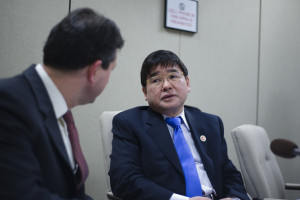
Councilmember Peter Koo. Image credit: William Alatriste / New York City Council
Proposed law sets requirements for holding hearings and decisions or risk automatic decalendaring. On April 28, 2015 a bill was introduced for consideration at the City Council’s stated meeting to create time limits on the City landmarking process. The bill, Intro 775, was introduced by Councilmembers Peter Koo and David Greenfield.
As written, the bill would require the Landmarks Preservation Commission to hold a public hearing on a proposed landmark within 180 days of moving to calendar the proposal. After the hearing is held, the Commission has another 180 days to approve designation of the landmark. If the Commission fails to hold the hearing or come to a decision within the respective 180-day limits, the proposed landmark would be automatically decalendared and could not be reconsidered by the Commission for five years. The bill extends the time limits in considering a historic district from 180 days to one year, with the same five-year prohibition if decalendared. If passed, the bill provides an 18-month window for the Commission to designate any proposed landmark or historic district already calendared before the automatic decalendaring and five-year prohibition would take effect.
In a joint statement, Councilmember Koo called landmarking in New York City “an arduous process that has kept many properties in a state of perpetual limbo, unable to reap the benefits of an actual landmark designation.” The councilmember stated the bill would create a predictable timetable for communities and property owners alike, and looked forward to discussing the bill with both. Councilmember Greenfield promoted the bill’s provision of an 18-month window to address already-calendared items a as a solution to the Commission’s backlog, stating some items have been calendared since the 1960s. A spokesperson for the Landmarks Preservation Commission told CityLand the Commission was currently reviewing the legislation.
Simeon Bankoff, Executive Director of the Historic Districts Council, released a statement arguing the legislation forces the Commission into a “do or die” schedule by discouraging consideration of landmarks rather than risk the five-year prohibition period. The statement also presented an HDC analysis of data from 2004-2015, arguing ninety percent of historic district designations were completed within two years, and claiming the problem Intro 775 was written to solve does not actually exist.
Andrew Berman, Executive Director of the Greenwich Village Society for Historic Preservation, opposed the legislation in a statement to CityLand as “written by the real estate industry” with no consultation of preservation or community groups. “Prohibiting the Landmarks Preservation Commission from considering a site or area for landmark designation for five years if they do not make a decision within a fairly limited time-frame is throwing the baby out with the bathwater. We all want to see the Commission make decisions in as timely a manner as possible. But sometimes the research and investigations, writing the legally-required designation reports, and political wrangling involved in getting a designation done takes time. To prohibit the commission from taking any action for years afterward if they do not act quickly enough is a backdoor way of blocking designations.”
City Council: Stated Meeting Int 0755-2015 (Apr. 28, 2015).
By: Michael Twomey (Michael is the CityLaw Fellow and a New York Law School graduate, Class of 2014).

